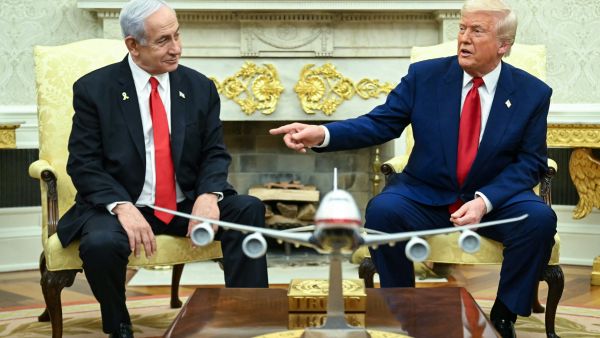ALBAWABA - As U.S. President Donald Trump gets ready to welcome Israeli Prime Minister Benjamin Netanyahu to the White House on Monday, the Middle East is preparing for what officials are describing as a potentially historic statement. According to Israeli sources, the two presidents might announce a truce in Gaza in addition to more extensive regional agreements involving nearby Arab nations.
The Washington Post reports that Israeli Ambassador to the UN Danny Danon called the meeting "extremely significant," highlighting its strategic importance for Gaza and the region at large. Danon emphasized that the proposed truce "is not a commitment to end the war," but Israeli authorities highlighted that it would enable flexibility to resume operations if necessary.
The anticipated declaration is interpreted as a component of President Trump's redoubled efforts to achieve a significant diplomatic triumph in the Middle East. Alongside the ceasefire in Gaza, normalization agreements with Israel's neighbors are apparently being worked on.
Significantly, Israel and Syria have discussed a peace agreement that Damascus calls a "non-aggression pact." Two major proposals are being considered to settle the Golan Heights dispute, which is the main barrier to a formal agreement, according to the Israeli channel iNews24.
In one possibility, Syria would regain a third of the key plateau, Israel would keep a third, and the other portion would be leased for 25 years. According to the second scenario, Syria would either regain or lease the remaining one-third of the land, with Israel holding the other two-thirds.
In the meantime, the US is putting pressure on Lebanon to think about signing a peace deal with Israel. Following the recent fighting, which made Hezbollah's hold weaker, the initiative gained momentum. Disarming the organization and giving the Lebanese army complete command of the entire nation, however, are still prerequisites for advancement. Redrawing borders and Israeli disengagement from southern lands would be part of the agreement, if it were accepted.
Following U.S. raids on Iranian nuclear sites and a mediated ceasefire between Israel and Iran, Trump met with Netanyahu. Though divisive among some of Trump’s base who oppose new military interventions, the U.S. President remains confident a broader agreement is within reach.
“I believe we’ll reach a deal next week,” Trump told reporters on Tuesday, noting he plans to be firm with Netanyahu about ending the ongoing conflict in Gaza.
Meanwhile, a revised 60-day truce agreement negotiated by Egypt and Qatar is being reviewed by Hamas. The group confirmed that intense diplomatic efforts are underway to narrow the gaps and reach a framework for further negotiations.
Trump said a response from Hamas is expected within 24 hours. Israeli officials are increasingly optimistic, suggesting there’s a real chance for a ceasefire and a deal to release hostages, nearly 21 months after the war began.
The recent U.S.-brokered ceasefire that ended a 12-day air battle between Israel and Iran has added momentum to ongoing mediation. On Tuesday, Trump confirmed that Israel has agreed to the core terms of a 60-day truce with Hamas, which would serve as a foundation for a permanent end to hostilities.










